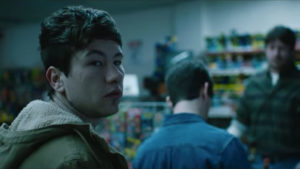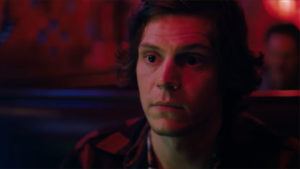Click here to listen to the interview with Bart Layton.
At a pivotal moment in Bart Layton’s emotionally charged AMERICAN ANIMALS, a character looks out of the car in which he is riding and sees the real person on whom he is based staring back at him as the car glides by. It’s not a gimmick, it’s a reinforcement of the way in which Layton has chosen to tell the true story of an audacious heist of rare books by four college students who were looking for more than just the monetary gain they would realize. And this is more than a narrative of a particular incident, rather it uses that incident to consider a larger, more disturbing issue about our culture and its effects on boys who have been led to believe that life offers more than it does.
Layton has constructed a memory palace, one that is prone, as memory is oft wont, to vagaries and conflicting recollections, not to be deliberately deceitful, but because differing viewpoints will always yield different accounts. The disclaimer at the beginning of the film alerts us that this is a true story, and that it isn’t. This being memory, both statements are true.

Barry Keoghan
It all begins with Spencer Reinhard (Barry Keoghan), an introspective young man rushing a fraternity and awaiting that transformative moment at Transylvania University in Kentucky that will change his life and make him a true artist. Like Van Gogh. As the real Spencer’s parents explain in the first of many cutaways to real life, he was a good kid until he fell in with Warren Lipka (Evan Peters), a fellow student with an outsized personality and a penchant for altruistic mischief that masks a deep-seated anger. The latter is demonstrated by the way he talks Spencer into stealing food from a restaurant in order to save it from becoming landfill, which, as he explains as he is picking the lock, is what happens to a hefty percentage of all food in this wasteful nation. Cut to the real Warren’s real father, who weeps over his son’s fate, and to one of the real Warren’s real college professors, who says he, too, was a good kid.

Evan Peters
And so they are. Good kids, that is, but also kids who long to be special, and therein lies their downfall. AMERICAN ANIMALS makes both points with unequivocal clarity and purpose. These are kids whose inchoate discontent finds expression in choices made for the excitement of the moment, the proof that they are special and somehow beyond the mere quotidian, the which they experience after the fact with aching despair and regret.
How the plan to accomplish that, to steal Audubon’s Birds of America along with a few other rare tomes came about is, as with so much else, remembered differently by Spencer and Warren, each giving the other credit, though a folie a deux seems like a reasonable compromise viewpoint. The idea certainly consumes both of them, eventually bringing in two friends, Eric Borsuk (Jared Abrahamson), the accounting major with plans to join the FBI to provide the brains, and Chas Allen (Blake Jenner), who is already on his way to real estate riches, to provide a getaway car.
The film embraces the essential absurdity of four amateurs planning a complicated heist in broad daylight, from an internet search for tips on how to pull off the perfect robbery to watching classic heist films. They begin to talk in film references, and Layton echoes that in the visuals, accentuating the fiction in which they are living in their heads, and making the inevitable crash when reality sets in all the more jarring. The absurdity slips away as the four, revealed to be callow youths, are thunderstruck, as are we, with how ill-equipped they are for this or any other adult undertaking. From comedy to tragedy in the time it takes to taser the plodding librarian (Anne Dowd) who stands in their way.
Combining narrative with talking head interviews with the principles and their families and by having them play off each other as the story progresses, Layton has synthesized a scathingly brilliant cinema genre: the non-fiction narrative (think Truman Capote’s non-fiction novel, In Cold Blood). He acknowledges that truth is fungible, and that the mysteries of why four good kids with bright, if unremarkable, futures before them, made their fateful choices, may be a symptom of a culture that prizes flash and dazzle over common sense. It certainly makes for one of the best, most daringly original films of 2018, and one of the most thought-provoking.
Your Thoughts?